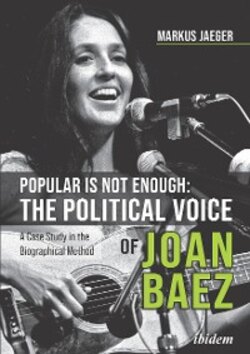Читать книгу Popular Is Not Enough: The Political Voice Of Joan Baez - Markus Jaeger - Страница 14
1.5.2 Words Do Not Change Society: Theory Versus Practice 1.5.2.1 On Fictitious Freedom
ОглавлениеAdorno (and his colleague Max Horkheimer) coined the term ‘Culture Industry’ in 1947, while still in US-exile at the University of Columbia, New York, where they spent more than ten years. Ironically, the freedom and openness which the members of the Frankfurt School found in American society on their flight from authoritarian repression in Europe, “[…] were the instruments, so their argument went, of its domination and repression.” (Berger 45). In their opinion, the Culture Industry’s freedom (as experienced in American mass culture) was only a fictitious freedom. Summarily, their argument went: the most important condition for the Culture Industry’s fictitious freedom was the fact that apparently free people were not about to organize their dissent against society’s numerous injustices. People who were convinced that they were free were not to become potential protesters against political misfortunes. Campbell and Kean explain the conceptual relevance of the Culture Industry in regard to possible social dissent—for them, Adorno and Horkheimer
[…] saw mass culture as a product of state monopoly capitalism seeking to mould the minds of working people by encouraging false needs whilst diminishing alternative ways of thinking that might have offered some opposition […] (Campbell and Kean 283).
This kind of brain-washing nature of the Culture Industry is only one tenor of Adorno’s and Horkheimer’s concept, which attempts to examine a general lack of opposition in society. This interpretation once more articulates Adorno’s theory that artifacts, as soon as they are consumed by more than a small number of intellectuals, are nothing but mere attempts to stultify people. Impressions of an intensified process of industrialization in the United States of America during World War II and its aftermath can be interpreted as another relevant actuator of their critical concept, which
[…] pinpoints the interconnections between economy and culture and how cultural texts and artifacts are produced in an industrial process. Cultural products, it was argued, were made in the same way as other items of consumption from soap to cigarettes […] (Smith Reinventing 44).
Particularly within the realm of a scientific debate about popular culture and its political significance, Adorno repeatedly emphasizes that listeners to popular music were nothing but mere consumers, stultified and not at all able to think in terms of political opposition (see also Kellner Critical Theory 73). The main platform for artifacts of popular culture are the mass media, which—in Adorno’s diction—“[…] had, in effect, prevented history from working out the way it should have, in Marxist terms, by subverting the masses […]” (Berger 43). The Culture Industry has extended organizational methods of monopoly and state capitalism into the arts (see also Paddison 202) and popular culture stands at the top of this development. This fundamental point of view only seemingly does not allow critics to voice at least some of their doubts about Adorno’s theoretical elaborations. Fortunately, not every scholar is as easily convinced by the radical concept of the Culture Industry in all terms (see also Docker 40-50). Docker, for example, exemplifies his doubts about Adorno’s and Horkheimer’s approach regarding the way people are dealing with their relationships to each other in the United States of America:
Not only do Adorno and Horkheimer know what true art must always involve, but they also know that the culture industry denies ‘truth’, for example, the ‘true kind of relationships’ human beings should have, but can’t, in democratic America […] (Docker 40).
This exemplary quote no longer offers a satisfactory conclusion when it comes to simple questions: How could they possibly know? How did they analyze the relationships of all American citizens? Is it possible to boil a discussion down on a simple statement: every single relationship of every single American has been a lie! Such—lightly ironic—questions are supposed to depict an element of criticism towards Adorno, which clouds the Frankfurt School’s aim to overcome totalitarian mechanisms in society. Docker supports my argument when he senses a certain elitist premise, which Adorno and Horkheimer assume, while descanting on the doubtful state of culture:
[…] in a monologic way, readers are positioned by the Culture Industry essay as passive, as having automatically to accept as received truths their totalising judgements […] (Ibid. 41).
The accusation of such a form of passiveness, which seems to be expected by the reader of Adorno’s texts, can be juxtaposed to the passive process of consuming artifacts of popular culture, a passiveness which for Adorno, on the other hand, is such an incisive reason for his passionate cultural criticism. Criticizing and at the same time expecting passive acceptance puts a big question mark on Adorno’s own credibility. Apart from the above-mentioned general passive position, which is forced upon Adorno’s readers, the subsequent pages briefly point out other important aspects which question Adorno’s aesthetic theory. Adorno, for example, does not take matters of categories all too seriously. This kind of looseness in treating musical categories is particularly interesting in regard to the musical background of Joan Baez.
